| dc.contributor.author | Bolton, Laura | |
| dc.date.accessioned | 2017-07-06T10:52:23Z | |
| dc.date.available | 2017-07-06T10:52:23Z | |
| dc.date.issued | 2017-02-27 | |
| dc.identifier.citation | Bolton, L. (2017). National Security Office responsibilities and functions. K4D Helpdesk Report. Brighton, UK: Institute of Development Studies. | en |
| dc.identifier.uri | https://opendocs.ids.ac.uk/opendocs/handle/20.500.12413/13056 | |
| dc.description.abstract | It should first be noted that only ‘grey literature’ was identified for this helpdesk. Some
information is included from government websites. Much of the material is commentary, included
to give an idea of what is being said on this area. It must be taken into account that this
information is conjecture. This rapid review found information on Canada, India, Iran, Israel,
Kenya, Serbia, South Africa, Trinidad and Tobago, the US, and the UK.
Across different country offices the key roles and responsibilities discussed in the literature for
National Security Adviser (NSA) offices include: Analysing security issues, assessing expected trends and prioritising activities; Playing an advisory role. Making recommendations to the Prime Minster or President; Policy making. In some countries the NSA make policies and in some countries the NSA review and make recommendations for policy-making; Coordinating and integrating work between different ministries. The degree of authority given to NSAs and National Security Councils varies between country and no one way has been identified as more or less successful. There are limited analyses of strengths and weaknesses of NSAs and NSCs in individual countries. There are also some analysis of how NSA responsibilities and functions in individual countries have changed over time. For example Best (2011) describes a history of the NSA in the US where different presidents used the NSA in different ways.
One of the problems identified with NSAs/NSCs is when responsibilities are poorly defined. It is important to identify who is responsible for what. Another problem identified across countries is lack of democratic or civilian control over NSAs/NSCs. A need for checks and balances is identified. The relationship of NSAs/NSCs to the military must also be clearly defined. Transparency of NSAs/NSCs is noted as important. As is the need for constitutional recognition of NSAs/NSCs role. | en |
| dc.language.iso | en | en |
| dc.publisher | Institute of Development Studies | en |
| dc.relation.ispartofseries | K4D Helpdesk Report;043 | |
| dc.rights.uri | https://www.nationalarchives.gov.uk/doc/open-government-licence/version/3/ | en |
| dc.subject | Globalisation | en |
| dc.subject | Governance | en |
| dc.subject | Security and Conflict | en |
| dc.title | National Security Office responsibilities and functions | en |
| dc.type | Helpdesk | en |
| dc.rights.holder | DFID | en |
| dcterms.dateAccepted | 2017-02-27 | |
| rioxxterms.funder | Default funder | en |
| rioxxterms.identifier.project | K4D | en |
| rioxxterms.version | AO | en |
| rioxxterms.funder.project | 9ce4e4dc-26e9-4d78-96e9-15e4dcac0642 | en |

